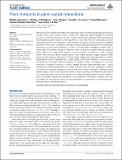Files in this item
Plant immunity in plant-aphid interactions
Item metadata
| dc.contributor.author | Jaouannet, Maëlle | |
| dc.contributor.author | Rodriguez, Patricia A. | |
| dc.contributor.author | Thorpe, Peter | |
| dc.contributor.author | Lenoir, Camille J. G. | |
| dc.contributor.author | MacLeod, Ruari | |
| dc.contributor.author | Escudero-Martinez, Carmen | |
| dc.contributor.author | Bos, Jorunn I. B. | |
| dc.date.accessioned | 2018-10-08T10:30:07Z | |
| dc.date.available | 2018-10-08T10:30:07Z | |
| dc.date.issued | 2014-12-01 | |
| dc.identifier | 256116099 | |
| dc.identifier | e5d2e9ea-556a-4a58-a859-94bb6e5b7b58 | |
| dc.identifier | 000347478400001 | |
| dc.identifier | 84914668939 | |
| dc.identifier.citation | Jaouannet , M , Rodriguez , P A , Thorpe , P , Lenoir , C J G , MacLeod , R , Escudero-Martinez , C & Bos , J I B 2014 , ' Plant immunity in plant-aphid interactions ' , Frontiers in Plant Science , vol. 5 , 663 . https://doi.org/10.3389/fpls.2014.00663 | en |
| dc.identifier.issn | 1664-462X | |
| dc.identifier.uri | https://hdl.handle.net/10023/16162 | |
| dc.description | The authors of this review are supported by BBSRC grant BB/J005258/1, ERC Starting Grant 310190-APHIDHOST, and a Royal Society of Edinburgh Personal Fellowship. | en |
| dc.description.abstract | Aphids are economically important pests that cause extensive feeding damage and transmit viruses. While some species have a broad host range and cause damage to a variety of crops, others are restricted to only closely related plant species. While probing and feeding aphids secrete saliva, containing effectors, into their hosts to manipulate host cell processes and promote infestation. Aphid effector discovery studies pointed out parallels between infection and infestation strategies of plant pathogens and aphids. Interestingly, resistance to some aphid species is known to involve plant resistance proteins with a typical NB-LRR domain structure. Whether these resistance proteins indeed recognize aphid effectors to trigger ETI remains to be elucidated. In addition, it was recently shown that unknown aphid derived elicitors can initiate reactive oxygen species (ROS) production and callose deposition and that these responses were dependent on BAK1 (BRASSINOSTERIOD INSENSITIVE 1-ASSOCIATED RECEPTOR KINASE 1) which is a key component of the plant immune system. In addition, BAK-1 contributes to non-host resistance to aphids pointing to another parallel between plant-pathogen and aphid interactions. Understanding the role of plant immunity and non-host resistance to aphids is essential to generate durable and sustainable aphid control strategies. Although insect behavior plays a role in host selection and non-host resistance, an important observation is that aphids interact with non-host plants by probing the leaf surface, but are unable to feed or establish colonization. Therefore, we hypothesize that aphids interact with non-host plants at the molecular level, but are potentially not successful in suppressing plant defenses and/or releasing nutrients. | |
| dc.format.extent | 10 | |
| dc.format.extent | 503979 | |
| dc.language.iso | eng | |
| dc.relation.ispartof | Frontiers in Plant Science | en |
| dc.subject | Aphids | en |
| dc.subject | Plant immunity | en |
| dc.subject | Effectors | en |
| dc.subject | Host range | en |
| dc.subject | Non-host resistance | en |
| dc.subject | QH301 Biology | en |
| dc.subject.lcc | QH301 | en |
| dc.title | Plant immunity in plant-aphid interactions | en |
| dc.type | Journal item | en |
| dc.contributor.institution | University of St Andrews. School of Medicine | en |
| dc.identifier.doi | 10.3389/fpls.2014.00663 | |
| dc.description.status | Peer reviewed | en |
This item appears in the following Collection(s)
Items in the St Andrews Research Repository are protected by copyright, with all rights reserved, unless otherwise indicated.

